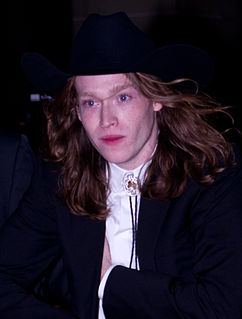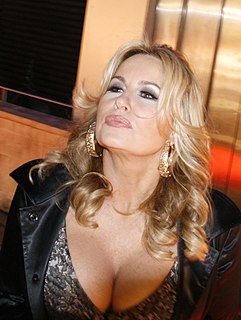A Quote by Hank Green
You can be empathetic to a character in a book in a way that you can't with a real person, which is weird, because you know everything there is to know about them.
Quote Topics
Related Quotes
You get to know a character that you play on-stage in a pretty profound way over a length of time. I don't want to sound highfalutin and say you become the character, you just start bringing more and more of yourself to the part until the character and actor, it's hard to tell them apart. It's some weird amalgam. In film, because of the period of time, I don't know that you ever get that deep into it.
Everything about a date is weird, especially if it's a new person you don't really know. You want to take them somewhere you think they're going to like, but you don't want to ask that question because you want to look like you're in control of the situation. So I think dates are just weird in general.
My father probably taught me everything I know, aside from dialogue, which I think I get from my mom a lot more. He certainly didn't teach me everything he knew, but you know he has got this book out called "The Spooky Art," which is essentially an advanced book on writing and it's not... You know it's not ABC, but it's for people who feel that bug and know that they're writers and are willing to put in that time alone. Pretty much the vast majority of what he taught me you can find in that book.
There are two magic acts I want to pull off when I write. One is creating a feeling that when you're inside a book, you believe everything you're reading even when you know it's not true. And the second is an extension of that, which is you know it's not true, you know it's not real, but you believe it anyway. And it's that believing of the story that isn't real that attracted me to writing and storytelling in general.
There's always mixed feelings about the work that I do. When you're playing a real person, that's another kind of responsibility. I have to say that every time that I have played a real person, even though I gave it everything I could, I feel like I misinterpreted trying to represent them. All the time I feel like I screwed it up! But I don't know if that's because I can't separate myself from it enough.
I try to do as much as possible for every character. Some of them, it is easier to do the research because you have either real examples that you work with, maybe some specific person that inspires you in that case, or the performances from other people, or the characters, or a character from a book.
Me writing the book and the subsequent interactions that we had were actually the cap on that experience. We were still in this weird purgatory about it when I published the book. When I gave them the galleys and what ensued after that, then I understood a lot more about our relationships and what the experience meant to them. I'd never wanted to know what they thought about it at all.
It is immature and lazy to imagine we know everything there is to know about someone before we know that someone. We don't know their stories, their histories, their real live human feelings. We don't know their favorite movies and best memories and what makes them afraid. It is unfair to take one fact, one thing they've said or we heard they said, or one thing they wrote, or someone else's experience, or a group they identify with and make a character sketch. If people did that to us, the picture would be so woefully incomplete, we wouldn't even recognize our own description.



































